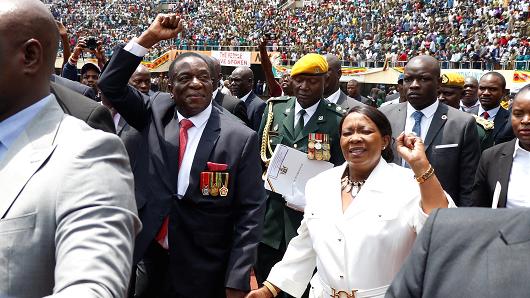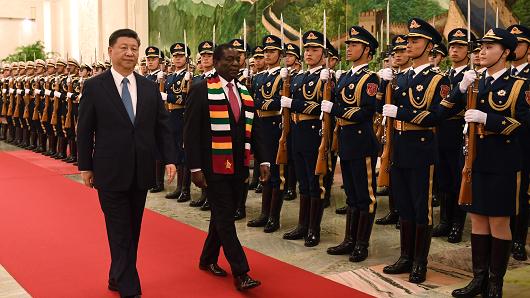Source: Zimbabwe: US could lift sanctions if Mnangagwa holds fair elections
- U.S. Senators Christopher Coons and Jeff Flake met with Zimbabwean President Emmerson Mnangagwa in Harare over the weekend to “explore ways of strengthening the bilateral relationship,” according to the U.S. embassy in Zimbabwe.
- Coons and Flake are behind a proposed amendment to the U.S.’ Zimbabwe Democracy and Economic Recovery Act which outlines the steps the African country must fulfill for U.S.-imposed sanctions to be lifted, namely the holding of “free and fair” elections.
U.S. Senators Christopher Coons and Jeff Flake’s visit to the Zimbabwean capital of Harare over the weekend was to “explore ways of strengthening the bilateral relationship,” said a tweet by the U.S. embassy there. The two politicians met with the new president, as well as members of the opposition and civil society.
Coons and Flake, both on the Senate Foreign Relations Committee, are behind a proposed amendment to the U.S.’ Zimbabwe Democracy and Economic Recovery Act (ZDERA). The bill details the steps which Zimbabwe must take for U.S. sanctions to be lifted, namely the holding of free and fair elections.
“The president (Mnangagwa) has made a commitment to take action, but some of the important actions required for progress towards the conditions for free and fair and credible elections have not yet happened,” Coons told the media, as reported by the Zimbabwe Mail.
A Congressional Delegation led by Senator Christopher Coons is in Zim 2 explore ways of strengthening the bilateral relationship. The five Senators met with President Mnangagwa, Members of the opposition and civil society, among others to discuss how best to work together. pic.twitter.com/YxUzdEzycP
— U.S. Embassy Harare (@usembassyharare) April 7, 2018
Mnangagwa has said that he is committed to holding open elections in July of this year and has invited external observers to the expected event.
It is hoped that such elections could lead to the removal of U.S.-imposed sanctions on Zimbabwe, which has seen its economy crippled by decades of mismanagement under former President Robert Mugabe.
But, “Lifting U.S. sanctions is time consuming and not straightforward,” Alex Vines, head of the Africa program at think tank Chatham House, told CNBC via e-mail. “The easiest way would be for the Zimbabwean government to prove that it’s fulfilled the requirements of ZDERA.”
Nonetheless, Coons and Flake’s visit could symbolize the latest in a warming of relations between the U.S. and Zimbabwe. In March, Mnangagwa penned a column in the New York Times which highlighted Zimbabwe’s newfound openness.
In February this year, U.S. chain Pizza Hut opened its first branch in Harare. The move, according to the U.S. embassy’s website, “is a demonstration that American companies see attractive business prospects in Zimbabwe.”
“We would hope to expand the people to people relationships, relationships between companies, hospitals, researchers, but also much more investment from the United States to reviving the economy to rebuilding infrastructure and advancing the country,” Coons told Zimbabwean news outlet NewsDay.
The U.S. has imposed financial sanctions on Zimbabwe since 2001, in response to human rights abuses by Mugabe. The sanctions include financial and travel restrictions, as well as banning the transfer of defense items or services.
Last week Mnangagwa was in China on a five-day state visit, his first outside of Africa since coming to power in November last year. He met with Chinese President Xi Jinping and other Chinese officials.
“The new president (of Zimbabwe) can expect to get both financial aid, more help with infrastructure (including the expansion of Harare airport) and technological assistance, as well as Chinese participation in agricultural projects,” Jonathan Fenby, China chairman at research firm TS Lombard, told CNBC last week of the visit.
In what could signify further rapprochement with the West, it has been reported that Zimbabwe is in talks to re-join the Commonwealth, a 53-nation bloc consisting of the U.K. and its former colonial territories. But, a spokesperson confirmed to CNBC on Friday that the organization has not received a formal application from Zimbabwe to do so.
Mugabe withdrew Zimbabwe from the group in 2003 following a dispute over sanctions.
Zimbabwe is a former British colony, previously known as Rhodesia, and was declared independent in 1980.


COMMENTS